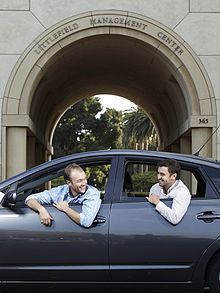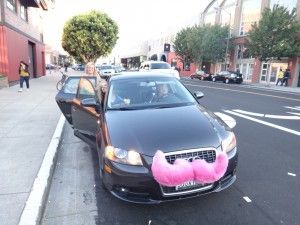BART strike revs up free market rides
by CalWatchdog Staff | July 3, 2013 7:36 am
July 3, 2013
By Katy Grimes
 [1]
[1]
Only two full days into the BART worker strike[2], it appears the 400,000 people who usually rely on the train system to get around the San Francisco Bay Area are resourceful. And, they’ve turned to a free market solution.
While Bay Area Rapid Transit[3] employees strike for higher pay and “safer” working conditions, their unions, the Service Employees International Union Local 1021 and the Amalgamated Transit Union Local 1555, duke it out with government officials.
But not everyone in the Bay Area is stranded.
Avego[4], one of the clever startup rideshare companies, jumped into action just in time for the strike Monday morning.
Avego marketed their services “with gusto” to commuters coming from the East Bay to San Francisco. “Avego was going beyond offering an easy way to share a ride with a stranger. The company was giving a few lucky commuters who downloaded its smartphone app a free helicopter ride to bypass the traffic,” CNBC reported[5].
“Sign-ups jumped from hundreds before the strike to thousands over the weekend, said Paul Steinberg, Avego’s director of operations for the Americas. ‘We’re getting creamed,’ he said.”
Rideshare under attack
The online rideshares, peer-to-peer taxis and carpool apps have come under attack by local politicians and regulating state agencies. There have been calls for bans because they compete with public transportation and taxis.
But these rideshare companies are the ultimate free market solution. Even with mass-transportation in the San Francisco Bay Area, the roads are horrifically congested. Commuters are always looking for creative ways to get around the problem.
“Some offer prescreened cars owned by professional drivers with black sedans or SUVs, while others provide ways to find commute partners and share the travel costs,” CNBC reported. “Some of the services get around safety regulations and government fees by offering a donation-based system.
The market has surged in the past year, with several leading firms saying this week that their business has been soaring.”
Most of the San Francisco rideshare companies have been running promoted Tweets that ensured tens of thousands of people who searched Twitter for “BART strike” would see ads and contact the companies.
Need a Lyft?
 [6]
[6]
“John Zimmer started Zimride[7], a service that matches drivers and riders for long trips, such as from San Francisco to Los Angeles,” KQED reported[8]. “He launched Lyft and describes it as a safer way to ride-share.”
Lyft[9] is an on-demand rideshare service that bills itself as your friend with a car. You contact your “friend” with a phone app, and a car shows up with fuzzy pink mustache strapped to the car’s front grille.
Lyft[9] drivers avoid taxi regulations because they take only prearranged rides, and never pick up fares curbside.
Uber[10], an on-demand town car service, also avoids the city’s taxi regulations by never picking up fares on the street.
Lyft lists their ride payments as “voluntary donations,” unlike Uber, which charges a minimum of $15 per ride.
SideCar[11], whose theme is “My ride is your ride,” is another online rideshare car service in San Francisco, and also uses a donation-based payment.
When users finish their Lyft or SideCar ride, they are provided a suggested price on their phone, based on the distance traveled and time in the car.
Riders can tap to accept and have money taken from their credit card or adjust the price and pay what they want.
But any time a new industry pops up,and usually out of need, another feels displaced.
“San Francisco’s taxi industry considers them unfair competition. And the California Public Utilities Commission, which regulates limo services, says they’re breaking the law,” KQED reported. “Over the past few months, the agency has sent cease-and-desist letters[12] to Lyft and at least two similar services, SideCar [13]and Uber[14].”
Hopefully, the free market will prevail. These rideshare car companies are brilliant and a very creative way to get around the congested Bay Area… as long as California doesn’t regulate them into oblivion.
BART pay vs. rideshare
BART employees’ average base salary for both station agents and full time train operators is around $56,000 a year, according to Mother Jones. And, the average overtime pay is around $10,000 for station agents and $17,000 for full time train operators.
A one-way BART ride from the city of Richmond to Embarcadero Square in downtown San Francisco is $4.60.
When I entered the same route on Avego, 23 different drivers popped up ready to give me a ride.
For just a few bucks, you can hitch a ride into the City with a “friend,” from the comfortable back seat of a car — and avoid the striking employees.
- [Image]: http://www.calwatchdog.com/2013/07/03/bart-strike-results-in-free-market-solution/220px-logan_green_and_john_zimmer/
- BART worker strike: http://sanfrancisco.cbslocal.com/2013/07/01/bart-workers-officially-strike/
- Bay Area Rapid Transit: http://www.bart.gov
- Avego: https://rtr.avego.com/rtr-desktop-web/
- reported: http://www.cnbc.com/id/100862460
- [Image]: http://www.calwatchdog.com/2013/07/03/bart-strike-results-in-free-market-solution/lyft_resize-300x225/
- Zimride: http://www.zimride.com/
- reported: http://www.kqed.org/news/story/2012/11/08/110777/
- Lyft: http://www.lyft.me
- Uber: https://www.uber.com
- SideCar: http://www.side.cr
- cease-and-desist letters: http://www.cpuc.ca.gov/NR/rdonlyres/03851232-DD84-47C1-B134-D90C8D15D3B7/0/CeaseandDesistLetters.pdf
- SideCar : http://www.side.cr/
- Uber: https://www.uber.com/cities/san-francisco
Source URL: https://calwatchdog.com/2013/07/03/bart-strike-results-in-free-market-solution/